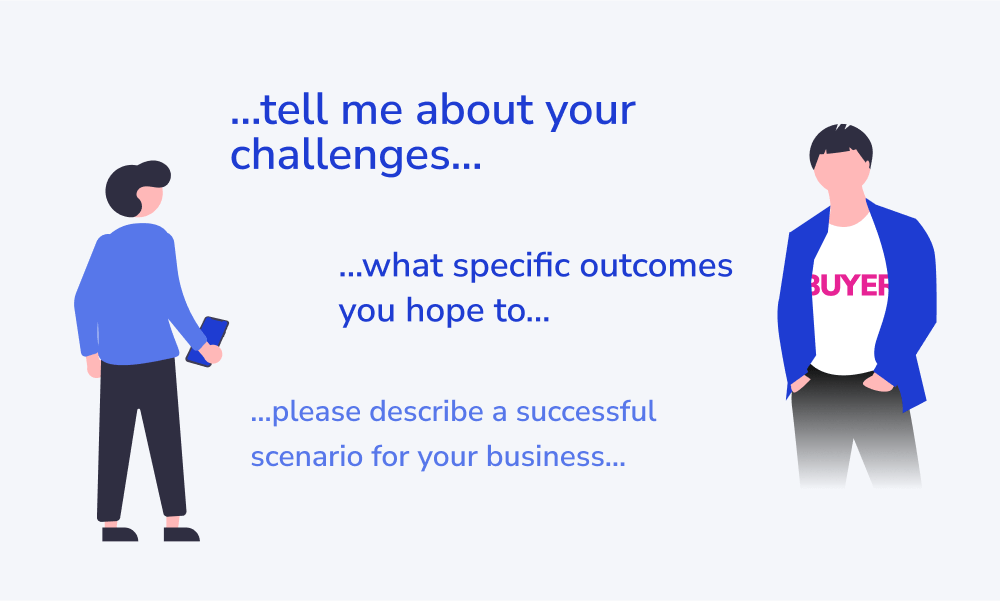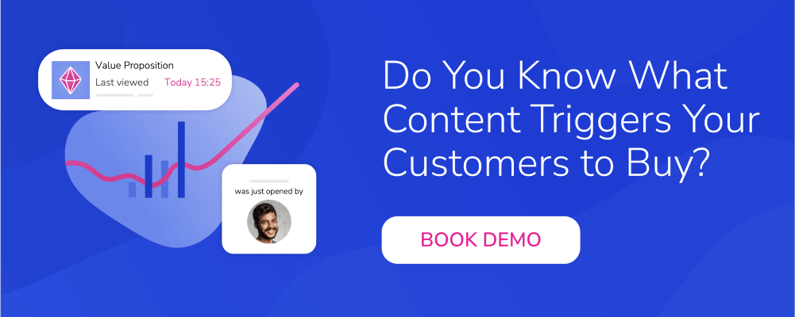Understanding your prospect is the cornerstone of any successful deal, and sales discovery questions are essential for uncovering their needs and challenges. Beyond showcasing your product or service, success hinges on truly understanding your prospect's aspirations and obstacles.
These questions are not just inquiries; they’re strategic discovery questions to decode your client’s core needs. In this guide, we’ll explore the mastery behind these questions and how they can transform your sales conversations into golden opportunities.
What you’ll learn here:
The Power of a Good Discovery Question
B2B sales requires more than a polished pitch. Success hinges on asking the right sales discovery questions to deeply understand your prospect’s world.
When delivered effectively, these questions reveal rich insights that might otherwise remain hidden. These insights enable sales professionals to tailor their approach, ensuring it resonates with each unique prospect.
Effective questioning also builds trust. When prospects see that you’re invested in understanding their needs, trust develops, laying the groundwork for a meaningful sales dialogue.
Why Are Sales Discovery Questions Important?
The primary purpose of sales discovery is to foster understanding and trust, transforming your conversation from a simple transaction into a collaborative problem-solving process.
Your strategic discovery questions can set you apart in a crowded market by:
- Uncovering your prospect’s unique challenges.
- Highlighting tailored solutions that resonate with their needs.
- Establishing a foundation of trust and partnership.
Understanding Your Prospect’s Pain Points
Recognizing your prospect’s pain points is key to driving meaningful conversations. Instead of overwhelming them with generic features, focus on the aspects of your solution that directly address their challenges.
The modern sales approach prioritizes consultative selling over one-size-fits-all pitches. Sales professionals who engage in thoughtful dialogues position themselves as trusted advisors, not just vendors. As noted in this Forbes article, successful sellers combine the roles of consultant and analyst, using sales discovery questions to delve into their prospects’ unique hurdles and deliver actionable solutions.
|
💡 Incorporating effective sales discovery questions with your customer needs analysis can be a powerful tool to fully align with your buyer's pain points. Learn more how you can extract genuine needs from our blog Customer Needs Analysis: Converting Challenges into Solutions. |
The Balance Between Open-ended and Closed-ended Questions
Knowing when to use open-ended versus closed-ended questions can give you a competitive edge in sales. Here’s how to balance both:
1. Open-ended Questions
- Deep Insights: Encourages prospects to share more, giving you a deeper understanding of their needs and challenges.
- Building Relationships: Fosters a conversational atmosphere, helping in building a rapport with your prospects.
For example, "Can you tell me more about the challenges your team is currently facing?", or "What has been your experience with similar solutions in the past?"
2. Closed-ended Questions
- Specific Information: Helps in gathering precise data and facts quickly, essential during the qualification stage.
- Guiding the Conversation: Allows you to steer the conversation in a particular direction, maintaining focus and efficiency.
These questions can look like, “Are you the primary decision-maker for this purchase?”, or “Would you be available for a follow-up discussion next week?”
Incorporating a mix of these question types into your sales dialogue ensures you not only gain a comprehensive understanding of your prospect's situation but also drive the conversation with purpose and clarity.
Strategies for Balancing the Two
- Initial Stages: Leverage open-ended questions to foster a dialogue that explores the broader concerns and objectives of the prospect.
- Mid-conversation: Utilize a mix of both open and closed-ended questions to delve deeper while also confirming understandings and creating a structured pathway in the conversation.
- Closing Stages: Employ closed-ended questions to confirm commitments, establish agreements, and set clear next steps, ensuring a smooth transition towards closing the deal.
Understanding and mastering the delicate equilibrium between open and closed-ended questions can significantly enhance the effectiveness of your sales discovery process, empowering you to gather rich insights while maintaining a focused and fruitful conversation.

When and Why to Use Specific Discovery Questions
Timing and context are everything when it comes to asking sales discovery questions. Here’s a breakdown of when to use different types of questions and why they matter:
1. Initial Conversations
- When: At the very onset, when you're setting the stage for a deeper relationship with the prospect.
- Why: At this stage, your aim is to establish rapport and gain an overarching view of the company and its needs. Here, broad, open-ended questions about the company's background, goals, and challenges are essential.
For example: "Can you provide a brief overview of your company’s current landscape?" or "What significant challenges are you hoping to address in the next quarter?
2. Deep Diving into the Problem
- When: Once you've garnered a basic understanding and are seeking more specific insights into their pain points and aspirations.
- Why: This is your opportunity to understand the nuances, implications, and context of their challenges. It requires a mix of open and close-ended questions to gauge both the breadth and depth of the issue.
For example: "How has this challenge affected your day-to-day operations?" or "Are there any metrics or KPIs that have been impacted by this issue?"
3. Solution Alignment
- When: After comprehending their challenges and as you start aligning your product or service as a potential solution.
- Why: The intent here is to tailor your offering to their specific needs, ensuring the prospect sees the value and relevance of your solution. This phase often involves more consultative questioning.
For example you can ask questions like, "How do you envision our solution fitting into your current workflow?" or "What specific features or functionalities are paramount for you?"
4. Closing and Commitment
- When: As you near the end of your discussion and aim to secure a commitment or advance to the next step in the sales process.
- Why: This is the stage where clarity, confirmation, and setting future actions come into play. Closed-ended questions that require definitive answers are crucial here.
Here are some sample questions: "Do you have any concerns or reservations about moving forward?" or "Are we aligned on the next steps and timelines?"
5. Strengthening the Relationship
- When: Sprinkled throughout the conversation, especially during moments of intensity or after delving into dense topics.
- Why: It's imperative to remember that sales are built on relationships. Personal connection questions help humanize the conversation, fostering trust and mutual understanding.
For example: "What's been your most rewarding project at the company so far?" or "Are there industry events or conferences you're looking forward to this year?"
Using these strategic discovery questions with intentionality, tailored to the specific stage and context of your conversation, can magnify their impact, allowing you to navigate the complexities of B2B sales with precision and empathy.
|
💡 Sales resistance is an opportunity to uncover customer needs and develop a solution. By understanding the reasons behind the resistance, you can better build trust and create more successful outcomes. Read more about How To Interpret and Overcome Sales Resistance in Sales Conversations. |
25 Essential Sales Discovery Questions You Must Know
Delving deep into the realm of sales discovery is about painting a vivid portrait of your prospect's landscape. It's more than just asking questions; it's about understanding the heart of their business, aligning your solution with their vision, and establishing genuine connections.
Below are 25 meticulously curated sales discovery questions, segmented into key categories to help you gain a holistic understanding of your prospect:
1. Company Vision and Strategic Direction
|
2. Needs and Challenges:
|
3. Goals and Objectives
|
4. Buying Process:
|
5. Decision Making:
|
Crafting your conversation with a balance of these sales discovery questions ensures you're not only addressing the tangible business challenges but also forging a genuine connection, creating a foundation of trust and understanding that can significantly impact the trajectory of your sales relationship.
7 Digital Tools to Deliver Your Sales Discovery Questions
The right digital tools can greatly improve how you discover information, whether it's through discovery calls or different types of surveys. Give your sales reps the tools they need to clearly understand a prospect's needs, challenges, and goals.
These platforms help salespeople gather useful information before having direct conversations, making those conversations more targeted and productive.
Here's a rundown of popular tools that can assist salespeople in delivering their discovery questions more efficiently:
1. Google Forms
A user-friendly tool that integrates seamlessly with other Google applications. Suitable for straightforward surveys. Google Forms are particularly easy to use, free, and provides instant analysis with Google Sheets.
2. SurveyMonkey
SurveyMonkey is one of the most popular online survey tools known for its ease of use and broad range of question types. SurveyMonkey provides analytics tools for survey results, offers customizable templates, and can integrate with CRM platforms.
3. Typeform
Typeform is a unique form tool that focuses on creating engaging, conversational surveys. Its advantages are fluid user experience, customizable templates, and diverse question types which can make the sales discovery process feel more interactive.
4. JotForm
JotForm is a versatile online form builder with various customization options, with key benefits like offering a wide range of templates, integrates with numerous platforms, and provides advanced features like payment integrations.
5. Microsoft Forms
Microsoft's answer to Google Forms, integrated with the Office 365 suite. Microsoft Forms' key Benefits: easy sharing with team members, real-time results and charts, and seamless integration with other Microsoft applications.
6. Zoho Survey
Part of the Zoho suite, this tool offers extensive survey functionalities tailored for businesses. Zoho Survey integrates with Zoho CRM, offers advanced reporting tools, and supports multilingual surveys.
7. Formstack
Formstack is a robust form-building platform with advanced functionalities tailored for businesses. It provides integrations with multiple platforms, offers A/B testing, and boasts of high-level data security measures.
In the intricate dance of B2B sales, the art of asking the right questions at pivotal moments plays a paramount role. These discovery questions not only shed light on a prospect's needs, challenges, and aspirations but also pave the way for meaningful, relationship-driven sales approaches.
Equipped with a strategic blend of open-ended and closed-ended questions, sales professionals can delve deeper, providing solutions that truly resonate. Mastering the right sales questions and phrases is essential to confidently guiding prospects toward a buying decision. And with the integration of digital survey tools, the process becomes even more streamlined, allowing for preemptive insights and a more focused dialogue.
If you're looking to elevate your sales strategy further, there's more to explore. Connect with our sales enablement experts today and discover how to leverage sales enablement for unparalleled success. Let's co-create your next big win!
Conclusion
Mastering sales discovery questions is key to building meaningful connections with your prospects. By strategically using open-ended and closed-ended questions and leveraging the right tools, you can uncover critical insights and position yourself as a trusted advisor.
Ready to improve your sales strategy? Connect with our sales enablement experts today.
💡 Learn next:

Curious how to start?
Discover how you can leverage sales enablement in your guided selling approach.
Book a demo today!




